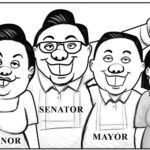Sheilla Lee, RN
As the ongoing pandemic has taken a devastating toll on our economy and society, it has become imperative for our political leaders to take bold steps to alleviate the suffering of the most vulnerable members of our community. In response, a number of social amelioration programs have been rolled out by government officials, aiming to provide relief to those who need it most.
While these efforts are certainly welcome, it is crucial that we scrutinize the effectiveness and intent behind these initiatives. In an era where mistrust and skepticism towards government is at an all-time high, we must ensure that these programs are genuinely designed to benefit the people, rather than simply being a tool to boost the politicians’ popularity ratings especially in the Philippines.
One of the most notable social amelioration programs has been the distribution of food packs, cash aid, and other forms of assistance to low-income families, students, and senior citizens. While these tangible forms of aid can go a long way in alleviating the immediate needs of those affected, it is important to recognize that they are only a Band-Aid solution to a much larger problem.
The root cause of poverty, hunger, and inequality is complex and multifaceted, requiring a comprehensive and sustained approach to address. Simply dispensing handouts may provide temporary relief, but it does little to address the systemic issues that have led to socio-economic marginalization.
Furthermore, the distribution of these programs often raises questions about transparency, accountability, and equity. Who is eligible? How are recipients selected? Are there any strings attached to these forms of aid? These are just a few of the many concerns that have been raised by experts and citizens alike.
It is also important to consider the broader implications of such programs on our society. Are we inadvertently creating a culture of dependency, where individuals become reliant on handouts rather than developing their own means to support themselves? How do these programs impact the social fabric of our community, potentially exacerbating existing social and economic disparities?
In conclusion, while the social amelioration programs launched by our political leaders are a well-intentioned attempt to address the suffering of the most vulnerable members of our community, we must remain vigilant and critical in our assessment of their effectiveness and intent.
Let us ensure that these programs are designed and implemented with the utmost transparency, accountability, and equity, recognizing that the ultimate goal should be to empower individuals and communities to rise above their circumstances, rather than simply patching up the symptoms of a deeper problem.
Only through a nuanced understanding of the complex issues at play and a commitment to genuine social change can we hope to build a more just, equitable, and resilient society for all.














